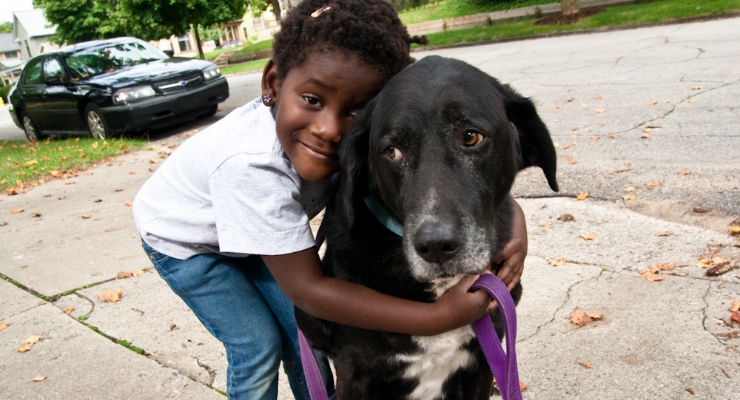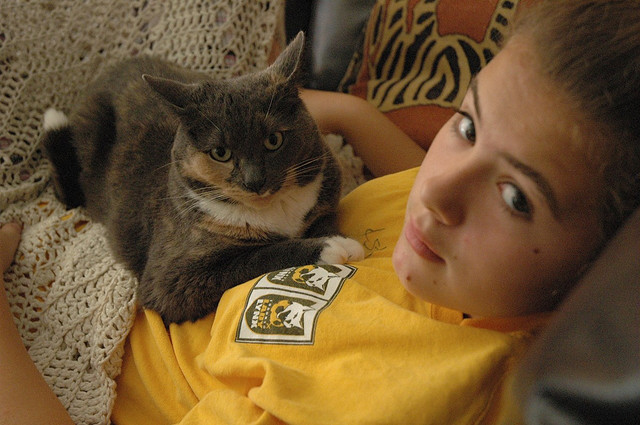
Who doesn’t want a puppy or a kitten, right?
A lot of us have been in the position of desperately wanting a puppy or kitten of our own — but had to go through Mom and Dad first.
I remember begging my heart out for a dog.
Now that I’m all grown up, I can tell you what would work on me if my son decided he wanted a puppy or kitten.
What Parents Worry About
The minute you say the word “puppy” or “kitten,” interesting things are happening in your parents’ brains.
Reactions usually fall between incoherent mental screaming and stark, clear visuals.
While your parents stare at you wordlessly for those 10 seconds, images such as chewed-up shoes, soiled carpeting, tattered furniture and a second mortgage to pay for it all are running through their minds.
Stop and think about this for a minute — while a ripped-up couch arm may seem like no big deal to you, a new couch can run anywhere from $400 to $1,000 or more.
So you first have to ask yourself this question: If your parents are thinking about destruction, how can you assure them that you’ll be able to limit that destruction?
Limit the Damage
Come up with a plan — and impress your parents by writing it all out.
Consider ways to minimize the destruction of property that your parents might have to pay for:
- Would your parents be opposed to installing baby gates during the house-training process?
- Is there a certain area of the house where your puppy or kitten could spend much of his time and still have the space to play freely?
- Is a den; a room in a heated, finished basement; or the kitchen available?
Be Realistic
Next, think about the responsibility of getting a puppy or kitten.
Pets depend on us for their wellbeing and welfare, and responsible pet caregivers meet those expectations constantly.
Many puppies need to burn a lot of energy to combat their playfully destructive behavior, which means lots of running around in the back yard or long walks or jogs.
Kittens need to be played with, taught and handled so that they become accustomed to people.
Your pet will have to be fed, washed, groomed and taken outside if necessary several times a day.
Consider the following:
Was YOUR Pet Food Recalled?
Check Now: Blue Buffalo • Science Diet • Purina • Wellness • 4health • Canine Carry Outs • Friskies • Taste of the Wild • See 200+ more brands…

- How will you work all of this into your schedule?
- Do you have after-school activities that take up some of your time?
- Are you willing to start waking up and getting out of bed a half-hour earlier than you normally do every morning?
This video features Percy the Labrador during his first week at home, and it’s a great example of what to expect with a new puppy:

Pets Cost Money — A Lot of Money
All pets require food and regular veterinary care. At first, you’ll spend money on toys and bowls and bedding — but it doesn’t stop there.
Vet visits will cost a few hundred dollars per year. Pet insurance is highly recommended.
In addition, you have to be prepared for the unexpected. Sometimes, completely by accident, pets get hurt or sick and need urgent medical care. This also can cost hundreds of dollars.
- How will you be able to help with this expense in the household?
- Are you willing to get a part-time job or do things around the house to take some of the burden off your parents?
Possible Deal Breaker: Pet Allergies
The deal breaker may be if you have an allergic parent or family member.
Allergic reactions range from mild sneezing to life-threatening reactions, and if your family member is someone who is violently reactive to your new pet, you probably aren’t going to convince your parents to get a puppy or kitten. (There are always furless options such as pet fish.)
Summary
Sure, you could try begging and begging and begging. That might work for some parents.
But the absolute best way to successfully convince your parents to let you have a new puppy or kitten is to prove to them that you are willing and able to step up and take on the responsibility.
You need to show them, not just tell them, that you have a plan to take care of your pet’s needs.
And, hey, if all else fails, show them the following section of this article:

6 Ways Pets Can Enhance Children’s Lives
Recent studies show that having a pet at a young age can improve a child’s health.
Pets also teach us about all aspects of life, including the emotional ones.
But how exactly do pets enhance the lives of children?
Here are 6 of the most important ways a pet could help your kid make the most of their childhood:
1. Playmates
Even if your child has plenty of friends or several siblings, he or she can always use an extra friend. And that is exactly what pets are — lifelong friends.
Your kids will be able to have fun and enjoy life when they’re with their pet. It will give them plenty of new games to play, such as fetch with a dog or playing with toys with a cat. Pets are a great way to keep your child entertained, especially if they are an only child.
2. Teaching Responsibility
Children learn that a pet has to be taken care of each day. This means feeding them, cleaning up their waste, playing with them and taking them for walks, as well as special events like taking them to the vet.
Having to take care of another living creature (under their parents’ supervision, of course) will show them that their actions affect others, which is the key to understanding responsibility.
3. Love and Happiness
Almost everyone realizes that happiness goes along with having a playmate.
All children have fun when they play, and this will bring them happiness. But that’s not the only way pets can make kids happy. Simply by being with them and showing unconditional love, pets add a great deal to children’s lives.
This unconditional love helps children develop self-esteem and confidence as they will always know that they are loved, not only by their parents, but by their pets as well. Pets also teach kids how to show love for others, a useful life skill that can lead to their happiness later in life.

4. Support and Compassion
“One of the greatest things pets can do is teach compassion and empathy,” says cat expert T.J. Banks.
Because of their unconditional love, pets are a great source of support and compassion for children.
If your child is having a bad day, you can almost always count on your dog (or similar pet) to notice and do their best to cheer the kid up, whether it’s by simply cuddling with them, giving them kisses or making them laugh.
This support, combined with the love pets bring, helps children develop compassion, which they need to help others. This will also help them make lasting, healthy relationships when they become adults.
5. Preventing Allergies and Asthma
New research is showing that pets can help with health in several ways, and that is part of the reason you will see dogs and cats visiting patients in hospitals.
Few people realize, however, that having a pet at a young age can actually help prevent the development of allergies and, in some cases, asthma as well. This is simply because exposure to pets and their dander starting early means that kids won’t be as susceptible to them later.
The research related to asthma is ongoing, but it seems that having pets can help prevent it in kids.
6. Understanding How Life Works
By having a pet, your child experiences all of the important stages of life that can sometimes be difficult to explain, such as birth, health, illness, growth and even death.
Although no parents want their child to experience illness or death, if your child is able to understand these life events early on, they will be better able to cope with them later.
In addition, growing up as their pet grows up gives children someone to share their lives and experiences with as well as a lifelong friend.


